- Home
- J. A. Konrath
Dirty Martini Page 3
Dirty Martini Read online
Page 3
I thought about the shots the nurse had administered the hour previously, and wondered if my dry mouth was the result of nerves or the result of a bad batch of vaccine.
“What’s the treatment?” I asked, my voice cracking slightly.
“Antitoxin and ventilation. It can take months to fully recover, and there may always be some residual paralysis. With effective treatment, there’s less than a twenty-five percent loss of life. If treatment is delayed, or if there’s a shortage of adequate equipment, the death toll rises.”
“Can people transfer it to each other?” the super asked.
“Normally, no. Botulism isn’t contagious. But we seem to be dealing with a weaponized form that may have inhalation properties, so if someone has BT on their hands or clothing, cross-contamination is possible. For example . . .”
He reached over and stroked the back of my hand. I felt another spark.
“. . . if I had BT on my fingers, I could have transferred a lethal dose to Lieutenant Daniels. The toxin can enter the body many different ways. The lungs, the stomach, wounds, mucus membranes”—his eyes met mine—“or through sexual contact. The spores will remain on her skin until they’re washed off.”
“Bleach?” I asked.
Rick smiled at me.
“A bubble bath would be fine.”
Then he lowered his eyes, for just a fraction of a second, and eyed the tear in my skirt. I felt my whole body blush.
Thankfully, he hopped off the desk and walked over to the corner of the room, where he’d left his briefcase. He dug around inside and pulled out a syringe, a salt shaker, and a spray bottle.
“I’ve been with the CDC crew all day, and we’ve been trying to imagine a delivery system to contaminate food. A syringe would be able to penetrate food products and offer the highest likelihood of spreading the disease. A squirt bottle, used by someone polishing fruit in the fresh produce aisle, would work, but the toxin doesn’t last too long when exposed to O2. But if the Chemist is using dry spores, which last longer in an oxygenated environment, a salt or pepper shaker would do the trick.”
“Do you know which he’s using?” Herb asked.
“We don’t know yet. We’ve found contaminated food, but no needle holes. And we haven’t seen spores on the outside of food in quantities that would suggest a shaker. He might be soaking food in the toxin at his home, then bringing it to the stores.”
“Where would he get the toxin?” Bains asked. “Can it be ordered online?”
Rick sat on the desk again, his crotch again at eye level. This time I looked. Ay caramba. Rick didn’t lack in that area either.
“The toxin is available for sale at hundreds of locations throughout Illinois,” he said. “Anyone with a few wrinkles will pay big money to get their hands on some.”
“Botox.” Davy smiled, and I noted that he had no smile lines at all.
“Exactly. In small doses, the same toxin that paralyzes your diaphragm can paralyze the tiny muscles in the face that cause frown lines and crow’s-feet. But pharmaceutical Botox sprayed on food wouldn’t cause the kind of epidemic we’re seeing here, and because Botox uses the toxin, not the bacteria, it can’t be cultured. A much easier source of botulism is honey.”
Rick waited for a response. I bit. “Honey?”
“Yes, darling?”
Bains thought this was hilarious. No one else laughed.
“Sorry.” Rick gave me an aw, shucks look that made my hormones gush. “Serious topic, thought some comedy might help. Honey contains botulism spores. That’s why it carries warnings on the label, not to feed to children under the age of one. Their intestinal bacteria aren’t mature enough to handle it.”
“You can culture botulism from honey?” Herb asked. He didn’t look happy.
“It isn’t easy, but it’s possible. Even from pasteurized honey.”
“So there’s no way to trace the bacteria strain?” Herb again.
“Anyone with some basic lab equipment and a few biology books could learn to culture botulism. Weaponizing it would be more difficult, but there’s a wealth of information on the Internet. This particular toxin has been identified as type E. It’s common to this area.”
O’Loughlin grunted, then said, “Botulism cases are monitored by the CDC, right?”
“They keep track of all reported cases, and hospitals are required by law to report them.”
“Is it possible the Chemist contracted botulism at some point? We could track past cases to find him.”
Rick nodded. “Good thinking, but there are fewer than one hundred cases of botulism reported every year in North America, and all have highly detailed patient histories. I’m guessing the Chemist hasn’t been infected with botulism. He’s probably being extremely careful. You don’t develop an immunity to BT, even if you’ve been exposed before.”
“I thought we all got vaccines,” Bains said.
“Those are experimental, and it’s unlikely that the Chemist has access to the vaccines. So far the public sector can’t obtain them.”
“What if he works for the government?” I asked.
“It doesn’t really matter. The only vaccines in production are for type A and type C strains.”
A little alarm went off in my head.
“You said we’re dealing with type E.”
“Correct.”
“So these vaccines won’t protect us from this illness?”
I watched Rick’s confidence slip a notch. “They may offer some protection.”
“Really?”
Rick frowned. “No.”
“How about antibiotics?” Bains asked.
“Works on the bacteria, not the toxin. The toxin is what kills you.”
Herb asked, “How about that antitoxin you mentioned?”
“That can halt advancing symptoms, but can’t reverse them. Once the nerve ending is paralyzed, it’s paralyzed forever. Which is why recovery takes so long—you have to grow new neurological junctions. But right now we’ve got two pharmaceutical companies working nonstop to supply Chicago with more doses. They should be able to provide us with a thousand by the week’s end.”
“We’ve already had three thousand reported cases,” I said, my stomach clenching. “What are we supposed to do?”
Rick looked at O’Loughlin.
“The federal government doesn’t make deals with terrorists,” he said, just as my cell phone buzzed. “But if I were you, I’d give the guy his two million dollars.”
I excused myself and answered the phone.
“Hi, Lieut. Hajek here. We’ve traced a print. It’s strange, though.”
“Cut the drama and spill.”
“Jason Alger, sixty-three years old, lives in Humboldt Park.”
“Record?”
“No. He’s one of ours. CPD, retired. I’d ask if maybe he came into contact with the envelope somehow, maybe visiting the station. But except for the super’s secretary, all of the prints are his, and one is beneath the adhesive stamp. He has to be the one that sent the letter.”
“Good work, Officer.”
I explained the situation to the room, and we were out the door thirty seconds later, off to interview one of our own.
CHAPTER 4
Four Hours Earlier
HE CALLS HIMSELF the Chemist, but he isn’t a chemist. He isn’t a botanist either, although the extensive greenhouse that takes up his entire backyard makes his neighbors think otherwise.
He’s just a simple government employee, unhappy with the system. But unlike the thousands of other government employees, punching their clocks, hating their lives, he’s devised a way to make the system pay.
The Plan is still in the first phase. He’s been working on it, refining it, modifying it, for six years, three months, and eleven days. Though he is not perfect, the Plan is. In four days, nine hours, and sixteen minutes, it will all be over. He’ll be rich, on a bus to Mexico. And Chicago, along with the entire Midwest, will be permanently crippled.
The apartment is all set. Has been, for over a week. A baited trap, waiting for the mice. It will make the TV news tonight for sure. Possibly even national. He considers setting the TiVo, but quickly dismisses the thought. He isn’t going to miss anything. They’ll repeat the footage.
The summer air is cool and crisp. It’s night, so activity will be minimal, but he puts on the netting just in case. It’s in a sealed plastic bin next to the greenhouse door. He places it over his head, then reaches for the gloves. They’re made of neoprene, chemical resistant, and he’s careful not to touch the outside of them as he slips them on.
The greenhouse door is locked with an electronic keypad beneath the knob. This high-tech addition was relatively cheap, and circumvents having to mess around with keys while wearing the gloves. It won’t deter someone serious—after all, the greenhouse is made entirely out of glass and plastic—but it will keep the neighborhood kids out.
That kind of attention would be most unwelcome, after the years of planning.
He punches the code and opens the door. The thermometer on the wall reads 102 degrees Fahrenheit. Part of this is due to the gas heaters. Part is due to the towering compost heap in the back, which recently received a particularly large infusion of organic matter.
The Chemist loves being in the greenhouse. An untrained eye would only see the beauty of nature expressed by the ranks and files of growing, thriving plant life. A keener eye would be able to spot the cruelty beneath the veneer.
It’s the cruelty that the Chemist adores.
He checks the hydroponics on a castor oil plant. Castors resemble hemp, but with six leaves rather than five. Next to it is a pallet of short green plants sporting delicate white flowers—lily of the valley. Behind them, oleander, the majestic flowers yawning open in the artificial light like pink fireworks. To their right, azaleas, with their startling bloodred buds, surrounded by netting much like his pith helmet, so the bees can’t get to them.
The Chemist steps over a tank of nitrox, navigates around several stacks of fertilizer, past piles of piping and boxes of roofing nails, and approaches a ten-gallon saltwater aquarium. Roaming along the bottom, among the sand and bits of dead coral, are over a dozen brilliantly colored cone snails, none longer than two inches. In the tank behind them, next to the cockroach pen, are fingerling goldfish. He takes the small net off its suction-cup hook, scoops up several feeders, and drops them into the snail tank.
Normally he’d stay to watch the feast, but he has other things to do tonight.
Near the rear of the greenhouse, between the nightshade and the jimsonweed, is his workbench. Assorted beakers, petri dishes, test tubes, flasks, stoppers, swabs, eyedroppers, and a variety of tools are arranged carefully in the six foam-lined drawers. He drags a large plastic garbage can over to his stool, then bends down and lifts a case of premium vodka onto the bench. Removing a fresh bottle by the neck, he holds it over the can and shatters it with a hammer, glass and vodka spilling onto his gloved hands.
He picks through the mess, finds what he wants, and sets it on a place mat atop the bench, next to half a box of shotgun shells. A pair of garden clippers catches his eye, its blades stained with dirt and dried blood.
The Chemist smiles at the memory they invoke.
He picks up the shears and carries them to the large industrial sink, between the refrigerator and the autoclave, near the rear of the greenhouse. He turns on the faucet and scrubs the shears with antibacterial soap. He also scrubs the remaining vomit from the ball-gag and the handcuffs, and then drops all three items into a bucket with a twenty-percent bleach solution.
When everything is rub-a-dub-dub clean, he glances at the clock and decides to head over to police headquarters on Thirty-fifth and Michigan.
He doesn’t want to be late.
CHAPTER 5
JASON ALGER RECEIVED his pension check at his home on the corner of Cortland Street and Hoyne Avenue, in the heart of a neighborhood known as Bucktown. He lived in an unassuming two-story residence with an ample backyard.
When we arrived on the scene, eight members of the Special Response Team—Chicago’s version of SWAT—had already secured the perimeter and were scanning the building with optics. Their vehicle, a souped-up bus known as the Mobile Command Post, was parked on the street alongside several patrol cars.
The head of this SRT, a bull-faced sergeant appropriately named Stryker, was squinting at some fuzzy pink images on a laptop display. He wore the standard tactical gear: black jumpsuit, body armor, riot helmet, radio headset, and a utility belt stuffed with equipment, including a gas mask.
“I’ve got two heat signatures on the first floor, and one on the second,” he said into his comlink. “No movement.”
“Human beings?” I asked.
He didn’t bother looking at me.
“Unconfirmed.”
I watched an SRT member reposition the thermal optics, and another, a woman, sweep the building with a DOX sound cannon—a device that looked like a bullhorn but was actually an ultrasensitive unidirectional microphone. Two others were examining a printout that showed the floor plan of the building.
These guys were fast.
“Stryker,” I said, tapping him on the shoulder. “Has your team been briefed?”
Again, the team leader didn’t so much as glance at me.
“Sixty-three-year-old Caucasian male, considered armed and dangerous, probable location in the rear bedroom on the second floor, no other civilian activity, possible presence of biological agents. Two by two surgical entry, Taser capture takedown.”
“He’s a cop,” I said. “His name is Jason Alger. I just cracked his file—his record on the force is golden. I also spoke to his former commander on the ride over. Alger was a straight shooter, family man, wife passed away six years ago, has a daughter and grandchildren in California. This isn’t in character for him.”
Stryker grunted, or perhaps it was a laugh. “Sometimes good apples get rotten.”
“And sometimes they get thrown away while they’re still good. Take it slow in there. Something isn’t right.”
“That’s the only time we get called.”
“Yeah. Well, good luck, Sergeant.”
“Luck is for the unprepared.”
I took a step back before the testosterone surging off his body caused me to grow a mustache. Special Agent Rick Reilly sidled up behind me, so close I could feel his body heat.
Or maybe that was my imagination.
“These guys any good?” he asked under his breath.
“They’re good.”
“They’ve got a lot of fancy equipment. Is the subject inside the house?”
“We’re not sure. Thermals have a few readings. Could be a person. Could be a radiator, or a fireplace.”
“In June?”
“Or a water heater or a stove.”
“I like his utility belt. He looks like Batman.”
Normally I didn’t mind jokes, but I was on edge.
“You’re a biology guy, right?”
“I’m a doctor, actually. But saying Special Agent Dr. Rick Reilly is too much of a mouthful.”
“Will those gas masks they have protect against BT?”
“They’re standard NBC masks—nuclear, biological, chemical. NATO threaded filters. Should be fine. You look worried.”
“I am worried. Show me a leader worth her salt who doesn’t worry.”
Rick pointed his chin at Stryker.
“GI Joe doesn’t seem worried.”
“And that worries me. Confidence is essential, cockiness is lethal.”
This was my show. I wondered if there was anything more I should be doing. Go in with them? I didn’t have that kind of training. And if I got into a whose balls are bigger spat with Sergeant Stryker it might be distracting, and I wanted him focused.
They know what they’re doing, I assured myself.
“Why aren’t you married?”
I narrowed my eyes at Rick, knocked off guard by the non sequitur.
“What does that have to do with this case?”
“Not a thing,” he said. “But it might have everything to do with grabbing a bite to eat later.”
“I have a fiancé,” I said.
“Forget to wear the ring this morning?”
His eyes had a playful glint to them, which annoyed me. This wasn’t the time or place for flirting. And cute guys had no right coming on to me only a few hours after the man I loved proposed marriage.
The man who was waiting patiently for me back at the house.
I excused myself and walked into the street, hitting the speed dial button on my cell phone.
“Hi, Latham.”
“Hi, Jack. Any chance you’ll be home soon? I made your favorite. Wiener schnitzel and spaetzle.”
German food was comfort food to me. I mentioned it offhandedly on one of our early dates, and the next time I went to his place Latham cooked it for me. Men who could cook trumped men with sexy bedroom eyes.
Not that Latham didn’t have sexy bedroom eyes.
I involuntarily glanced at Rick, noticed he was watching me, and gave him my back.
“You’re a sweetheart, Latham. I’ll try my best, but I’m in the middle of something big.”
“I understand. I’ll wait for you.”
The man was a saint.
“No. Go ahead and eat without me.”
“Are you sure?”
“I insist. I don’t know when we’ll finish up here. It could go late.”
“I’ll keep it warm for you.”
“The food?”
“Everything.”
Some paramedics pulled up. Standard procedure for a smash and grab, but it made me even more uneasy.
“How’s that mariachi?” I asked. “Did he ever find the rest of his mustache?”
“No. I think Mr. Friskers ran off with it.”
I smiled for the first time in hours.
“Look, Latham, I know I owe you an answer . . .”

 What Happened to Lori
What Happened to Lori Shot Girl
Shot Girl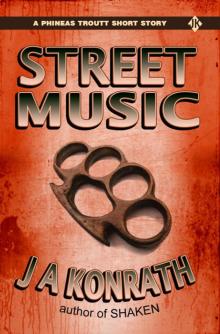 Street Music
Street Music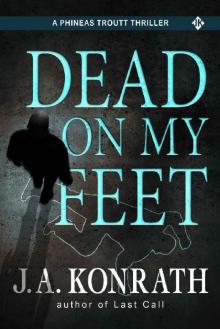 Dead on My Feet
Dead on My Feet What Happened To Lori - The Complete Epic (The Konrath Dark Thriller Collective Book 9)
What Happened To Lori - The Complete Epic (The Konrath Dark Thriller Collective Book 9)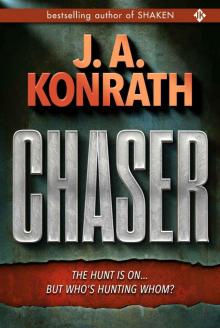 Chaser
Chaser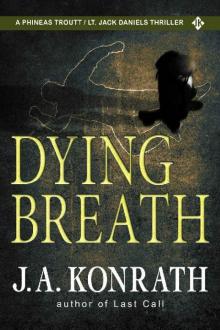 Dying Breath - A Thriller (Phineas Troutt Mysteries Book 2)
Dying Breath - A Thriller (Phineas Troutt Mysteries Book 2)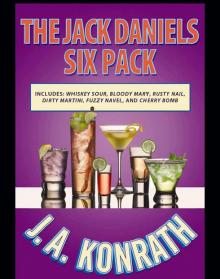 Jack Daniels Six Pack
Jack Daniels Six Pack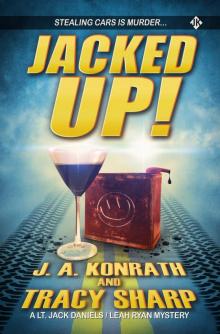 Jacked Up! (A Lt. Jack Daniels/Leah Ryan Mystery)
Jacked Up! (A Lt. Jack Daniels/Leah Ryan Mystery)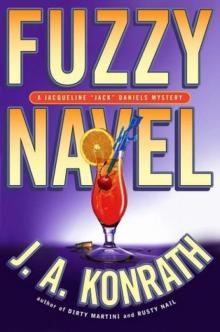 Fuzzy Navel
Fuzzy Navel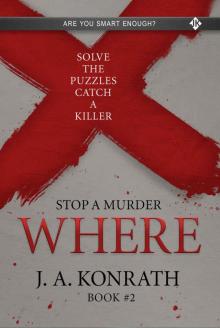 STOP A MURDER - WHERE (Mystery Puzzle Book 2)
STOP A MURDER - WHERE (Mystery Puzzle Book 2) Epitaph
Epitaph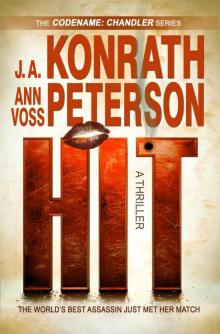 Hit: A Thriller (The Codename: Chandler)
Hit: A Thriller (The Codename: Chandler) Cheese Wrestling: A Lt. Jack Daniels/Chief Cole Clayton Thriller
Cheese Wrestling: A Lt. Jack Daniels/Chief Cole Clayton Thriller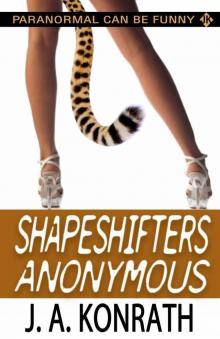 Shapeshifters Anonymous
Shapeshifters Anonymous STOP A MURDER - HOW (Mystery Puzzle Book 1)
STOP A MURDER - HOW (Mystery Puzzle Book 1) Bloody Mary
Bloody Mary Dying Breath
Dying Breath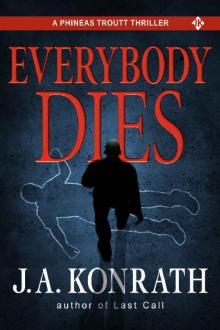 Everybody Dies - A Thriller (Phineas Troutt Mysteries Book 3)
Everybody Dies - A Thriller (Phineas Troutt Mysteries Book 3) DRACULAS (A Novel of Terror)
DRACULAS (A Novel of Terror) Shot of Tequila
Shot of Tequila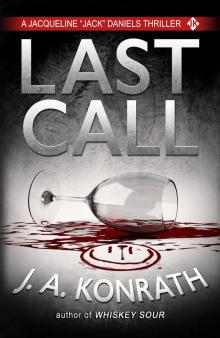 Last Call - A Thriller (Jacqueline Jack Daniels Mysteries Book 10)
Last Call - A Thriller (Jacqueline Jack Daniels Mysteries Book 10) Holes in the Ground
Holes in the Ground![Shaken [JD 07] Read online](http://i1.bookreadfree.com/i1/04/01/shaken_jd_07_preview.jpg) Shaken [JD 07]
Shaken [JD 07]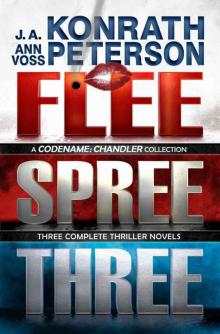 Flee, Spree, Three (Codename: Chandler Trilogy - Three Complete Novels)
Flee, Spree, Three (Codename: Chandler Trilogy - Three Complete Novels)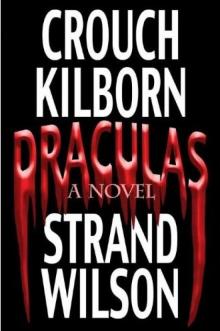 Draculas
Draculas Jack Daniels Stories
Jack Daniels Stories Wild Night is Calling
Wild Night is Calling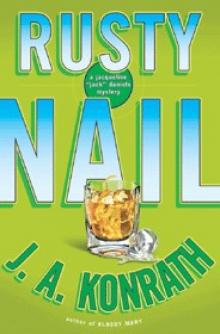 Rusty Nail
Rusty Nail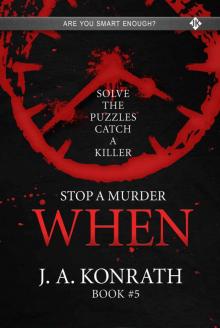 STOP A MURDER - WHEN (Mystery Puzzle Book 5)
STOP A MURDER - WHEN (Mystery Puzzle Book 5) Whiskey Sour
Whiskey Sour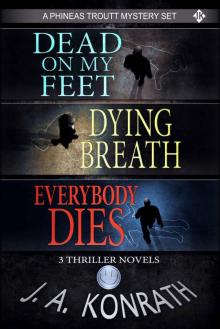 Phineas Troutt Series - Three Thriller Novels (Dead On My Feet #1, Dying Breath #2, Everybody Dies #3)
Phineas Troutt Series - Three Thriller Novels (Dead On My Feet #1, Dying Breath #2, Everybody Dies #3)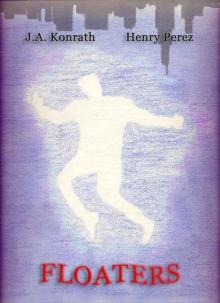 Floaters - A Jack Daniels/Alex Chapa Mystery
Floaters - A Jack Daniels/Alex Chapa Mystery J.A. Konrath / Jack Kilborn Trilogy - Three Scary Thriller Novels (Origin, The List, Haunted House)
J.A. Konrath / Jack Kilborn Trilogy - Three Scary Thriller Novels (Origin, The List, Haunted House)![Shaken (Jacqueline Jack Daniels Mysteries) [Plus Bonus Content] Read online](http://i1.bookreadfree.com/i2/04/10/shaken_jacqueline_jack_daniels_mysteries_plus_bonus_content_preview.jpg) Shaken (Jacqueline Jack Daniels Mysteries) [Plus Bonus Content]
Shaken (Jacqueline Jack Daniels Mysteries) [Plus Bonus Content]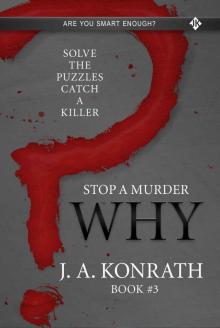 STOP A MURDER - WHY (Mystery Puzzle Book 3)
STOP A MURDER - WHY (Mystery Puzzle Book 3)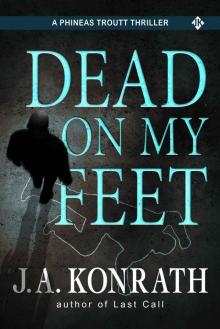 Dead On My Feet - A Thriller (Phineas Troutt Mysteries Book 1)
Dead On My Feet - A Thriller (Phineas Troutt Mysteries Book 1) Cherry Bomb
Cherry Bomb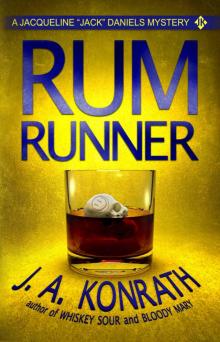 Rum Runner - A Thriller (Jacqueline Jack Daniels Mysteries Book 9)
Rum Runner - A Thriller (Jacqueline Jack Daniels Mysteries Book 9)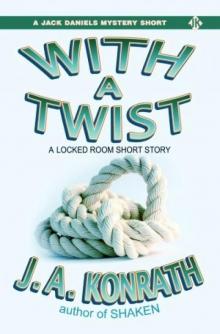 With a Twist
With a Twist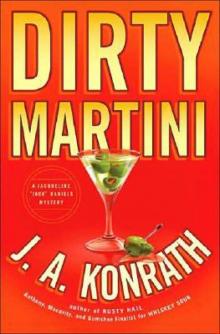 Dirty Martini
Dirty Martini Naughty
Naughty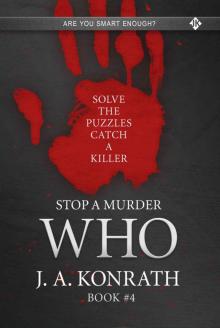 STOP A MURDER - WHO (Mystery Puzzle Book 4)
STOP A MURDER - WHO (Mystery Puzzle Book 4)